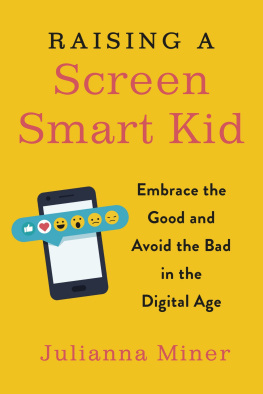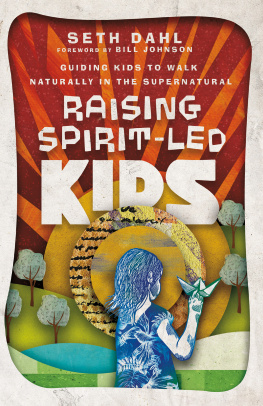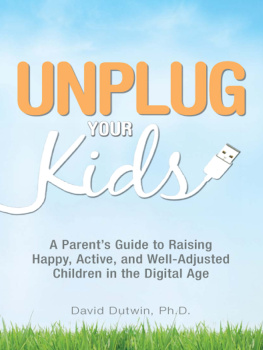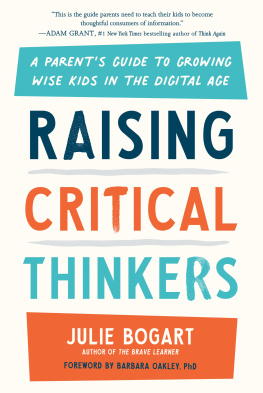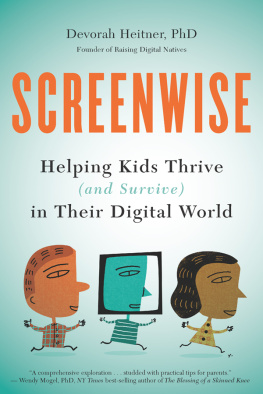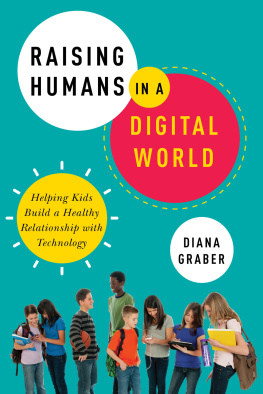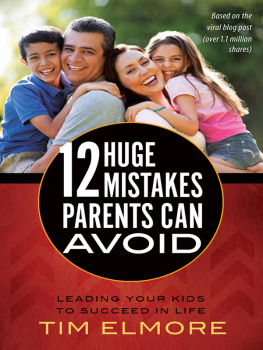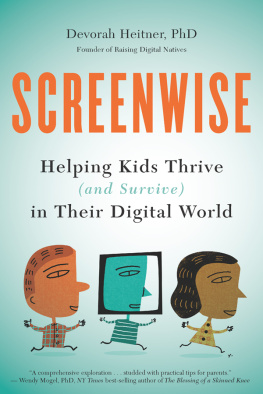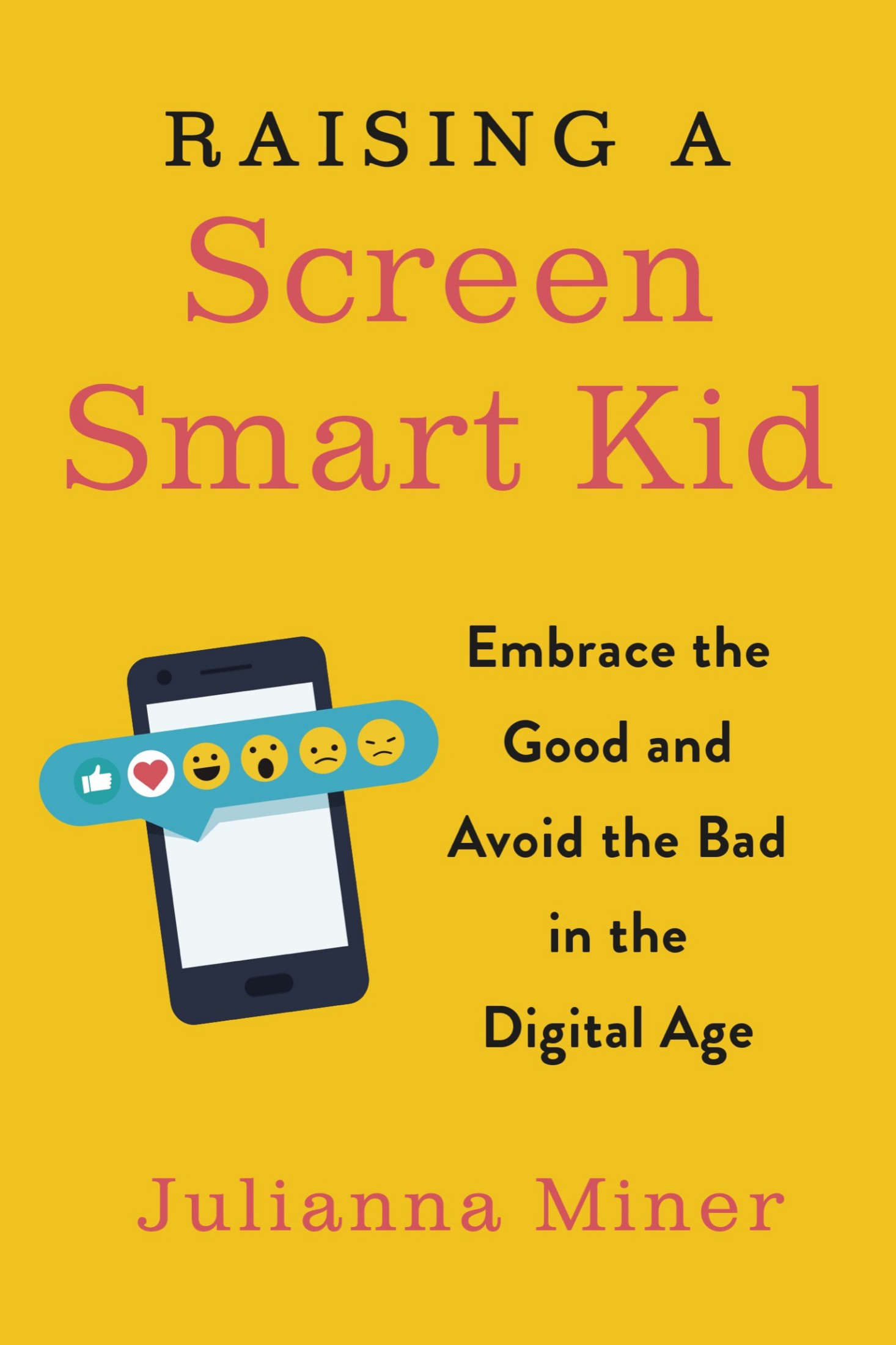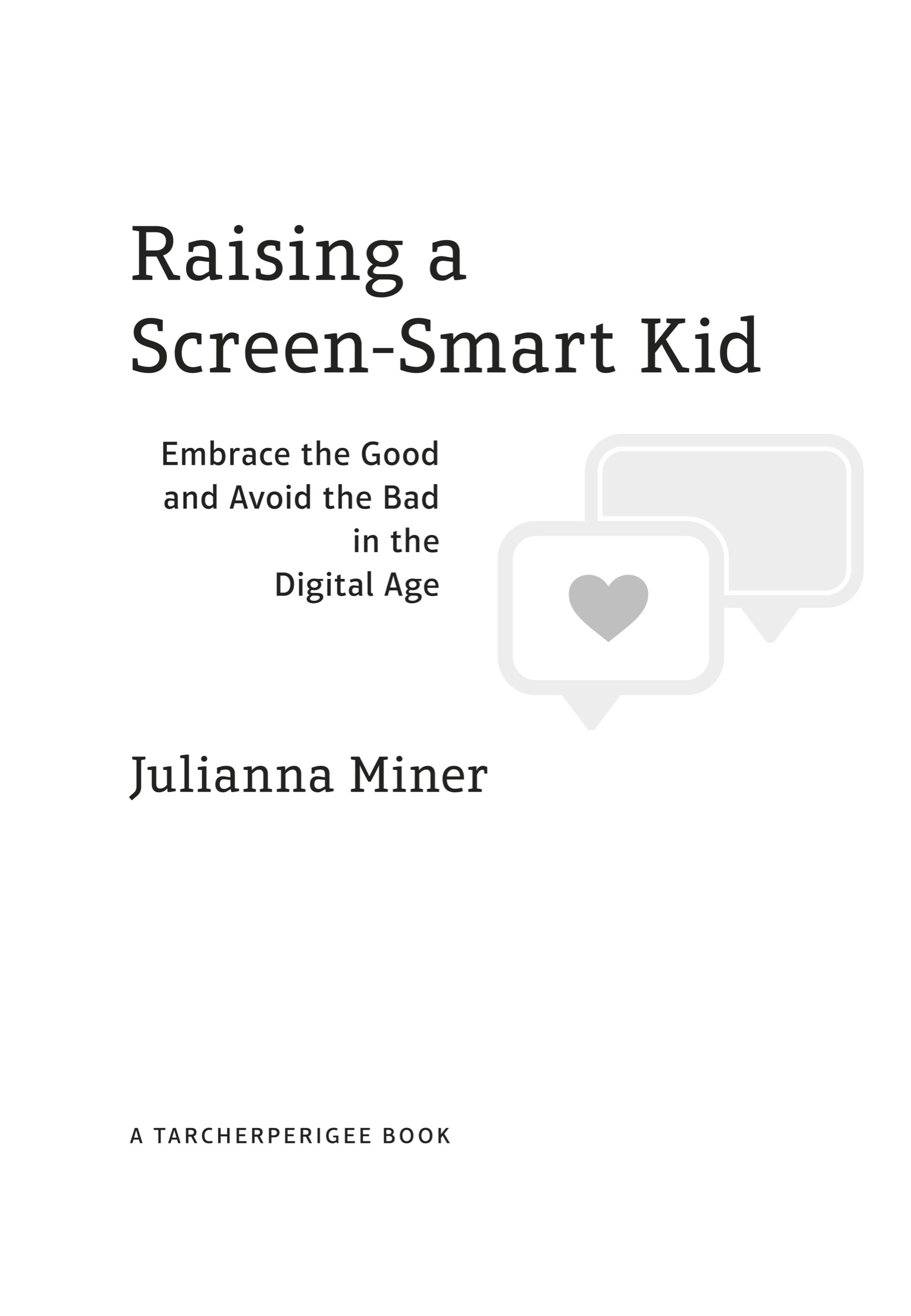ADVANCE PRAISE FOR
Raising a Screen-Smart Kid
A great resource for parents who are looking for reliable, commonsense information about online threats posed to their kids so they can evaluate risks without letting fear drive parental decision-making.
John F. Clark, president and CEO of the National Center for Missing and Exploited Children
Julianna Miner describes the state of the science around kids and technology accurately. It is messy. The digital landscape is changing faster than the speed of scientific research. Miners approach of using the best evidence, common sense, and a lot of calm is perfect.
W. Keith Campbell, PhD, coauthor of The Narcissism Epidemic and professor of psychology at the University of Georgia
What I love about Raising a Screen-Smart Kid is Julianna Miners clear-eyed understanding that our hope, as parents, should not be to scare, threaten, or push our kids into a certain relationship with tech and screens, but to teach them to use these tools in a way that furthers their goals and increases their happiness. This is a book that will calm your fears and help you help your kids learn to live in this world.
KJ DellAntonia, author of How to Be a Happier Parent
The internet can be a dangerous place for childrenone in which seemingly innocuous websites can in fact lead to treacherous and heartbreaking consequences. Raising a Screen-Smart Kid is filled with expert advice, as well as accounts from kids and their mentors, and provides a critical understanding of how parents and coaches can best support the youth in their lives in navigating our increasingly complicated digital world.
Steve Salem, president and CEO, Cal Ripken, Sr. Foundation
The manual every parent needs right now! Parenting tweens and teens in the digital age can be terrifying, so its nice to know Julianna Miner is on our side.
Jen Mann, bestselling author of People I Want to Punch in the Throat
Believe me, kids know more about the internet than a parent ever will. If you want to make your kids safer and be on the same page with them, read this book.
John Walsh, cofounder of the National Center for Missing and Exploited Children and host of Americas Most Wanted
Raising a Screen-Smart Kid will help parents connect with and find empathy for young people growing up in the digital age.... Julianna Miners insights on the nuances of friendship, dating, and self-esteem help parents identify the most crucial points for understanding and supporting kids without succumbing to anxiety and despair.
Devorah Heitner, PhD, author of Screenwise
Full of humor and empathy, Julianna Miner shows anxious parents that navigating the digital age with their kids isnt as daunting as they might think.
Jill Smokler, New York Timesbestselling author of Confessions of a Scary Mommy

An imprint of Penguin Random House LLC
penguinrandomhouse.com
Copyright 2019 by Julianna Miner
Penguin supports copyright. Copyright fuels creativity, encourages diverse voices, promotes free speech, and creates a vibrant culture. Thank you for buying an authorized edition of this book and for complying with copyright laws by not reproducing, scanning, or distributing any part of it in any form without permission. You are supporting writers and allowing Penguin to continue to publish books for every reader.
TarcherPerigee with tp colophon is a registered trademark of Penguin Random House LLC.
Library of Congress Cataloging-in-Publication Data
Names: Miner, Julianna, author.
Title: Raising a screen-smart kid : embrace the good and avoid the bad in the digital age / Julianna Miner.
Description: New York : TarcherPerigee, 2019. | Includes bibliographical references and index.
Identifiers: LCCN 2019005256 | ISBN 9780143132073 (paperback) | ISBN 9780525503811 (ebook)
Subjects: LCSH: ParentingPsychological aspects. | Internet and childrenSafety measures. | SmartphonesSocial aspects. | BISAC: FAMILY & RELATIONSHIPS / Life Stages / School Age. | COMPUTERS / Web / Social Networking. | PSYCHOLOGY / Developmental / Adolescent.
Classification: LCC BF723.P25 M564 2019 | DDC 155.6/46dc23
LC record available at https://lccn.loc.gov/2019005256
p. cm.
While the author has made every effort to provide accurate telephone numbers, Internet addresses, and other contact information at the time of publication, neither the publisher nor the author assumes any responsibility for errors, or for changes that occur after publication. Further, the publisher does not have any control over and does not assume any responsibility for author or third-party websites or their content.
Some names and identifying characteristics have been changed to protect the privacy of the individuals involved.
Version_1
This book is dedicated to my husband, Matt, without whom I would be lost.
And to our children. This book exists for one reason: because I love you.
CONTENTS
1
The Last Analog Dinosaurs Raising the First True Digital Generation
MY STORY (AGE THIRTEEN, 1986)
I vividly remember being thirteen years old and the new girl in eighth grade. It was 1986 in Princeton, New Jersey. I was an only child and I had just transferred back to public school after several years as a student in a fancy private school. My mother had remarried the year before, and the additional income my new stepfather brought to the table put us somewhere between losing my need-based scholarship and being able to afford the full tuition. I spent most of my time alone. I didnt really belong with my more affluent peers but seemed to have little in common with the kids in my neighborhood, many of whom I didnt even know.
That meant a fresh start for eighth grade in a public school near my dad and stepmothers house. While that prospect was scary, I was ready for it. Switching schools was going to open doors and allow me to reinvent myself. I was awkward and wore the wrong clothes. I was (or had been) the scholarship kid, and everyone knew it. And if that wasnt enough, I was a blurter.
I may have been an ADHD kid, but back then teachers just told my mother that I was a daydreamer who couldnt seem to work to her potential. I was easily distracted and would allow myself to wander into dreamy wormholes during class or at the lunch table, achieving Walter Mittylike trances, where I would become almost completely unaware of my surroundings. And then I would blurt out something that reflected the reality in my head.
I think we can all agree that is not a prescription for being cool in middle school.
I did not let my social awkwardness stop me, however. I had a picture of who I wanted to be at my new school, someone cool. Someonedare I say it?popular. Most of this mental picture was formed by the seventies-era sitcoms I watched over and over again after school. I could be cool, right? It was possible.
Well, no, the actual cool kids let me know that wasnt going to happen after about a week. The good news was, I met a friend who helped break that fall. She was the other new girl, and she was nice enough to overlook the fact that I was kind of a mess. Things were awkward for me at home, with a new stepfather at one house and my stepmother newly pregnant at the other. Things were equally awkward at school because I had no idea how to get out of my own head and just be a person. Eventually I made a couple of nice friends, and it seemed as if I might survive the year and make it to high school.

